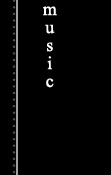




Without technology our lives would be remarkably different. We all know this, but James Cooley has created a different, particular kind of knowledge of how a man’s relationship can bond with technology. For Cooley’s is an inextricably tied association that, without their shared power and employment, he may be an altogether different man. For where he was known by three names: a first, middle and last – he condensed it all down into the essence of three syllables and one word: Mesita. He has been playing the guitar since he was in the second grade – always doodling on his father’s guitars. But it was seven years ago where everything changed, for it was then that Cooley was given access to a multitrack recorder. A fairly solitary creature, the idea and invention of recording and bouncing tracks down to make room for more proved to be a godsend. This palette of knobs and buttons and tape recording gave Cooley the ticket to strike-out on his own – in his secluded basement – making music by his own, as an Argonaut and a man taking the time to shape his future one song at a time. Now, fast-forward to 2011 and James Cooley is Mesita and his music is being heard around the world. He has recorded three EPs. His songs are on the recently-released MTV program, “Skins”. He has received record label interest. Ears are being turned in the direction of his bright symphony. On every song, Cooley plays all the instruments: from drums, to bass, to keys, to six-string, to horns and singing. What’s remarkable is perhaps the fact that he wasn’t trained on any of them: he learned everything on his own. What’s even more remarkable is that, while he is driven to write, driven to create work – he doesn’t overextend himself: he knows his limitations. Cooley knows how well he can play a horn – and while he isn’t afraid of adding it (that’s why he learned how to make it squeak at all), the profundity is his ability to place the sound, to achieve the sound, to find the color, the texture that is needed, in the song. Like many in his generation, growing-up around electronic music has influenced the decisions that Cooley is making in front of microphones, with acoustic instruments. Instead of staying inside the bounds of four or five simple chords, hackneyed harmonies and predictable rhythmic cadences and movements – Cooley’s songwriting decisions are more orchestrated. His songs can be a bit unpredictable – or if not that, then there is just an appearance of tremendous intelligence. Exact and heartfelt communication of very human moments and expressions – sometimes too accurate. The sheer amount of stylistic voicings that he uses in the course of five songs is astonishing. The textures and stops and changes that he employs are sophisticated – they call for more than a casual knowledge of just a couple of musical styles. Mesita is a project which understands the peace in chaos. It is a project which finds its greatest breath in the winds of choppy waters. Cooley’s sense of writing for more than just a guitar is obvious: he won’t agree but it certainly sounds like he writes for an orchestra. His orchestra is one which takes listeners on a sweet and often divine romp through intoxicated landscapes where the ground heaves and swells as a heart delights in the reflecting ponds and sunny trees. James Cooley is very particular. At least he is about his music. As a result, the prospects of Mesita turning into something that is played-out live is unreasonable – at this point. Hiring musicians to play the personal parts that he wrote and created and texturized – would be a grand challenge, for certain. Truth is, Cooley is quite content writing, conceptualizing and creating music on his own. Where all the responsibility is on him for his creations: quantitatively and qualitatively – there is also fear in that space where there is reward. For Mesita, there are no excuses to produce – there is no real interference – apart from himself. And so: If nobody were to ever hear his work – that would be his fault. If his songs weren’t understood as to be for public consumption – that would be his fault. But, When a record label calls, then flies him out to New York – or when MTV calls and places his songs on their programs – then, it’s all his fault too. For Cooley, songwriting is an experiment. He always start with a melody and then builds, as he records everything by himself – one instrument at a time – the song may spawn branches: he may take the song two ways, based on a small movement, a twinge of texture. As a result, instead of finishing his debut LP, he has created three separate EPs. Because everything spawns branches and the main tree isn’t done growing yet, so he builds on one of its branches – to complete something a bit smaller and while representative – not as massive, not as close to the sky. Mesita’s fertile soil is enriched by the idea that melody is the song. Rhythm provides power and the gait – the movement. Mesita is about optimism. But somehow I have the feeling that the music may be the talks he has with himself – about his future, about who he is and who he wishes to become. For his lyrics are beyond his years as a 22 year old man. we are seeing feeling mystical things and we are beautiful and we are worth it all and we are living/breathing i want to tell you all, you mean everything to me and we are always one even when we disagree there is something magical here even when we don't believe we are loving bleeding conscious things Mesita is a voluptuous beam of light. It is the sound of standing tall in a moment and rejoicing even in haste. Even in sadness. Mesita is a small town in the middle of the largest valley on earth where James Cooley dances every night when the people fall to sleep. Quietly, with his headphones on – dancing and singing and rejoicing below the divine cosmos. To that end, James Cooley makes me want to dance more. Love more. Rejoice, more. For you don’t need to be older than me to inspire me: We are seeing, feeling, mystical things. Download Mesita’s albums for free, here: www.mesitamusic.com |









